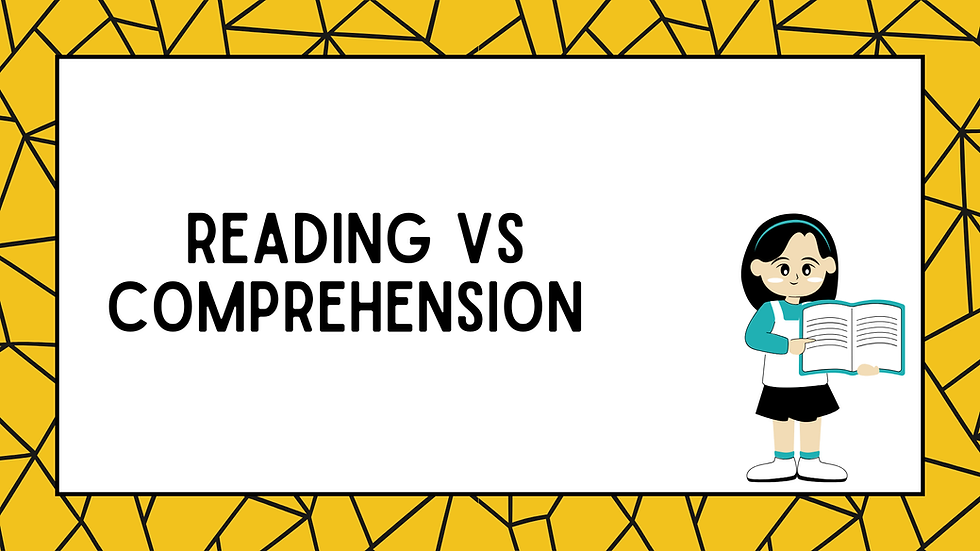Top tips for stress-free learning
- Ed Grande Tuition
- Feb 13, 2023
- 3 min read
Learning can be a lot of fun, but it can also be stressful for children. It is important to find ways to make learning a more positive experience. Whether your child is just starting school or is in the middle of their academic journey, it's important to find ways to make learning as stress-free as possible.
Here are some tips to help your child have a free stress-free learning experience.
Make a schedule

Having a schedule can help your child feel more in control and reduce stress. This can include time for homework, studying, fun, and breaks. For example, you can schedule 20 minutes on Monday for your child to complete one page of their Maths homework; and on Tuesday, schedule 15 minutes to read together as a family.
A schedule can provide a sense of stability and predictability, which in turn will help your child stay on top of their work, not feel overwhelmed and enjoy learning.
Download our editable template below:
Find a quiet place to study
A quiet and a distraction-free place to study is essential for concentration. It will help your child focus and reduce stress.
Help your child find a quiet place in the house where they can focus on their work without distractions. This can be a designated room, a corner of a room, or a desk. Make sure the space is well-lit and has all the materials your child needs, such as the pencils, pens, erasers, sharpeners, highlighters, and extra sheets of paper.
Once you have created a study space, encourage your child to use their study space at the times you have scheduled for them to study.
Make learning fun
Learning does not always have to be through reading, writing, and solving maths or science questions.
Making learning fun for your child increases motivation, engagement, and retention. By incorporating play and excitement into the learning process, your child is more likely to be interested in the subject and retain information for a longer period of time.

Games, puzzles, quizzes, and role-playing makes learning interactive and exciting. For example, family games like, scrabble helps your child build vocabulary and spelling. Having a debate night helps your child with explaining various concepts, making arguments, and building confidence. Online maths games also make the learning process more enjoyable.
Take breaks
It's important to rest and take breaks. Taking breaks prevents burnout, and it helps your child reduce stress and recharge. Studies have shown that taking breaks can improve focus and productivity in the long run. Encourage your child to take a short break throughout the day, to stretch, have a snack or do something enjoyable. Remember to include short breaks in your child’s weekly schedule.
Encourage self-care
Self-care is essential for stress-free learning. This can be done through physical activity or relaxation techniques.
Encourage your child to get active by participating in sports, taking walks, or doing physical exercise. For example, a family workout as part of your Saturday morning routine; or a family daily walk. Physical activity helps to relieve stress and improve focus.
You can also teach your child relaxation techniques, like taking deep breaths. This will help them manage stress and improve their well-being overall.
Keeping a journal will help your child practice self-care and will also them improve in the English subject. Journaling improves writing skills and will also help them understand and gain control of their emotions.
Encourage your child to practice self-care activities such as exercise, yoga, meditation, or journaling to help them relax and de-stress.
Sleep is also crucial for learning. Make sure your child is getting enough sleep each night to ensure they are well-rested and ready to learn the next day.
Be supportive
Finally, be supportive of your child's learning journey. Providing support and encouragement can help your child feel more confident and reduce stress.
Let your child know that they are not alone and that you are there to support them. Listen to their concerns and offer help when needed. A supportive parent can make all the difference in a child's learning experience.
Don’t forget to offer praise and rewards for completing tasks or reaching goals. Positive reinforcement is a great way to motivate your child and promote a positive learning experience.
Remember:
Learning can be stressful for children, but with the right tools and support, it can be a stress-free experience. Encourage your child to make a schedule, take breaks, get enough sleep, find a quiet place to study, use positive reinforcement, practice self-care, and more importantly, be supportive.
We are dedicated to supporting you help your child at home, and we are committed to helping your child build positive learning habits. Find out how we can support you and your child today.




